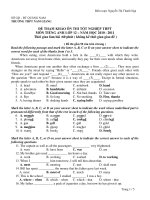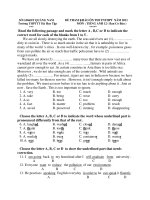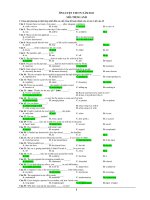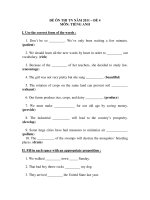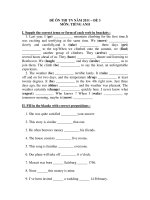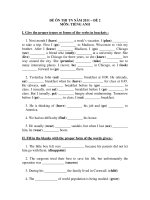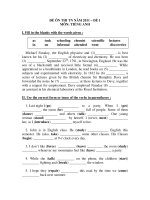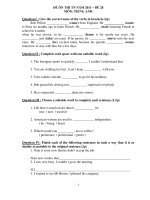- Trang chủ >>
- Đề thi >>
- Đề thi tuyển dụng
Ngân hàng câu hỏi tiếng anh ôn thi công chức 2018
Bạn đang xem bản rút gọn của tài liệu. Xem và tải ngay bản đầy đủ của tài liệu tại đây (578.43 KB, 92 trang )
PART A
Question 1
HONEY
Honey is a sweet liquid made by bees. It (1)……….. of water and sugars. Bees may
travel as (2)……….. as seventy-five thousand kilometres and visit over two million
flowers to produce just half a kilo of honey. The colour and flavour of honey depend on
the type of flower visited. In fact, there are more than three hundred (3)……….. of
honey. The lighter-coloured ones are generally milder in flavour than darker honey.
In ancient times, honey was the main sweet food, as sugar was very rare. Honey was of
great (4)……….. to the ancient Egyptians, who used it as payment.
Today, honey is produced and eaten in (5)……….. part of the world. Research suggests
that it prevents tiredness and improves athletic performance. However, honey is not just
food - it can be taken for sore throats and is used in many skin and hair-care products.
1.
a) includes
b) consists
c) involves
2.
a) soon
b) far
c) well
3.
a) sets
b) differences
c) varieties
4.
a) charge
b) value
c) cost
5.
a) every
b) most
c) all
Question 2
The History of Shoes
In the past, importance was not given to shoes being comfortable or fashionable. These
early foot coverings were probably animal skins, (1)……….. People tied round their
ankles during cold weather. We still use leather today, but (2)……….. Materials such
as silk, plastic, or cotton are also popular, depending on what is in fashion.
It was only one hundred and fifty years (3)……….. that people began to wear a different
shoe on each foot. Formerly, the two shoes had been straight instead of shaped and
(4)……….. Be worn on the left or the right foot. All shoes used to be made by hand, but
now, although there are shoemakers still using their traditional skills, most shoes are
now machine-made in large factories. The introduction of sewing machines (5)………..
The shoe industry to produce large quantities of cheaper shoes for a wider range of
buyers.
1.
a) where
b) which
c) why
2.
a) another
b) both
c) other
3.
a) after
b) beyond
c) ago
4.
a) might
b) could
c) ought
5.
a) allowed
b) gave
c) got
Question 3
Tom Cruise
Tom Cruise is one of the most successful actors in cinema history. However, life hasn't
always been that easy for him. As a young boy, Tom was shy and had (1) ……….. in
finding friends, although he really enjoyed (2)……….. Part in school plays.
After he had finished High School, Tom went to New York to look for work. He found
employment as a porter, and at the same time he (3)……….. Drama classes. In 1980,
the film director Franco Zeffirelli(4)……….. Tom his first part in a film. Ten years later,
he had become so successful that he was one of the highest-paid actors in Hollywood,
earning millions of dollars for each
film.
Today, Tom still appears in films and is as (5) ………..as ever with his thousands of
fans from all around the world
1.
a) problem
b) difficulty
c) fear
2.
a) making
b) taking
c) holding
3.
a) waited
b) prepared
c) attended
4.
a) suggested
b) tried
c) offered
5.
a) preferred
b) favourite
c) popular
Question 4
ZOOS
People began to keep animals in zoos over 3,000 years ago, when the rulers of China
opened an enormous zoo called the Gardens of Intelligence. In many of the early zoos,
animals (1)……….. taught to perform for the visitors. This no longer (2)……….. and it
is accepted that the purpose of zoos is for people to see animals behaving naturally.
Today, most cities have a zoo or wildlife park. However, not everybody approves of
zoos. People who think that zoos are a good idea say they (3) ……….. us with the
opportunity to learn about the natural world and be close to wild animals. Both of (4)
………..would not be possible without zoos. On the other hand, some people disapprove
of zoos because they (5) ……….. it is wrong to put animals in cages, and argue that
in zoos which are not managed properly, animals live in dirty conditions and eat
unsuitable food.
1.
a) had
b) were
c) have
2.
a) develops
b) happens
c) becomes
3.
a) bring
b) make
c) provide
4.
a) whose
b) what
c) these
5.
a) expect
b) believe
c) imagine
Question 5
Henry Ford
Henry Ford was born on a farm in Michigan in 1863 but he did not like farming. When
he was fifteen he began work as a mechanic and in 1893 he built his first car. After he
(1) ………..drivenit1,500 kilometres, he sold it and built two bigger cars. Then, in 1903,
he started the Ford Motor Company. By(2)……….. strong but light steel, he built cheap
cars for ordinary people to buy. In 1908, he built the first Ford Model'T', which sold for
$825. He was soon selling 100 cars a day. By 1927, the Ford Motor Company was
(3)……….. $700 million. Early Ford cars were simple and cheap, but (4)……….. things
simple sometimes (5) ……….. less choice. 'You can have any colour you like,’ said
Henry Ford of the Model T, 'as long as it's black.’
1.
a) is
b) had
c) was
2.
a) operating
b) using
c) putting
3.
a) worth
b) rich
c) expensive
4.
a) staying
b) remaining
c) keeping
5.
a) planned
b) meant
c) decided
Question 6
Approximately 350 million people speak English as their first (1) …....... .About the
same number use it as a second language. It is the language (2) …....... aviation,
international sport and world trade. 75% of the world's mail is in English, 60% of the
world's radio stations (3) …....... in English, and more than half of the world's
newspapers are printed in English. It is an official language in 44 countries. In (4) ….......
others, it is the language of business, commerce and technology. There are many
varieties of English, but Scottish, Australian, Indian and Jamaican speakers of English,
in spite of the differences in pronunciation, structure and vocabulary, would (5) ….......
that they are all speaking the same basic language.
1.
a) linguistics
b) linguist
c) language
2.
a) from
b) of
c) on
3.
a) show
b) write
c) broadcast
4.
a) an
b) much
c) many
5.
a) invent
b) use
c) recognize
Question 7
I had a terrible time last Saturday. It (1)……….. cold, but quite sunny, so after lunch I
walked into town. I wanted to buy a pullover. I was looking in the window of a clothes
(2)……….. when someone stole my wallet. While I was walking home, it started
(3)……….. and I arrived home cold and miserable. I decided to have a hot bath. I was
getting ready to have my bath (4)……….. the doorbell rang. It was a flower seller and
it took me several minutes to make him go away. Unfortunately, all the time he was
talking (5)……….. me, the water was running. You can imagine how the kitchen was!
1.
a) has been
b) was
c) were
2.
a) café
b) shop
c) bar
3.
a) rains
b) rained
c) to rain
4.
a) where
b) so
c) when
5.
a) out
b) on
c) to
Question 8
There are five different types of rhino in the world today. The Black and White Rhino
live in the open fields of Africa. The others live in forests in Asia. All rhinos have big,
heavy bodies. Their skin is very hard and they have very (1) …...... hair. The great body
of the rhino stands (2) …...... four short legs. Each foot has three toes. They usually walk
very slowly, but they can run at 50 kilometres an hour. Rhinos are usually quiet and
calm animals, and they only (3)…...... grass and other plants.
A baby rhino weighs 40 kilos when it is born. It has been inside its mother (4) …......
about fifteen months. An adult rhino weighs over 200 kilos and may (5) …...... to be 50
years old.
1.
a) little
b) few
c) many
2.
a) at
b) on
c) in
3.
a) eat
b) ate
c) eats
4.
a) for
b) since
c) during
5.
a) live
b) living
c) lives
Question 9
The Korean education system basically consists of primary schools, secondary schools,
high schools, and colleges (1)…...... universities, with graduate courses leading to Ph.D.
degrees. Primary education is compulsory for children aged six (2)…...... eleven. The
basic primary school curriculum is generally divided into eight subjects: the Korean
language, social studies, science, (3)…...... , ethics, physical education, music and fine
arts. Students in secondary schools are required to take a number of additional subjects,
such as English, and can take electives, (4)…...... as technical or vocational courses.
Afterwards, students can choose between general education and vocational high schools.
(5) …...... general, high school tends to be strict, as college and university admission is
very competitive.
1.
a) but
b) or
c) as
2.
a) to
b) with
c) for
3.
a) mathematics
b) mathematically
c) mathematician
4.
a) so
b) alike
c) such
5.
a) In
b) On
c) Of
Question 10
When Bo the cat decided to explore a furniture van, she had a bigger adventure than she
expected. She was discovered (1)………..the driver, after he had completed a trip of
over 500 kilometres. It was the end of a long day. The driver and the cat were both
hungry! He gave her some milk and started making enquiries. He telephoned his last
(2)………..,but they had not lost a cat. It was getting late, so he took Bo home for the
night and (3)………..morning delivered her to an animal hospital.
The cat’s owner had done some detective work too. After (4) ………..everywhere for
the cat, he suddenly remembered the furniture van which had made a delivery to a
neighbour. Fortunately, he remembered the name of the company. He called their office
and in a short time Bo was (5)………..safely.
1.
a) by
b) at
c) from
2.
a) buyers
b) customers
c) shoppers
3.
a) tomorrow
b) following
c) next
4.
a) searching
b) seeing
c) watching
5.
a) returned
b) brought
c) given
Question 11
What is money? The pound, the dollar or the euro are actually just like
a gram or a
kilometre. The difference is that you can exchange money for something (1) ………...
A ten pound note may buy a book, a huge bag of sweets, or a couple of cinema tickets.
But the note itself is only a printed (2)……….. of paper which costs almost nothing to
make. Thousands of years ago, people didn’t have money as we know (3) ……….. .
There were no banks or even shops. In those days, Mr. Green the farmer exchanged the
corn he had grown for Mr. Hive’s honey. This was an exchange arranged between two
people each of whom had something that the other wanted. But in time, most societies
invented their own ‘currencies’ (4) ……….. that people could exchange more. The
different currencies began to join together, which is why (5) ………..everyone uses the
same currency in their country
1.
a) else
b) other
c) another
2.
a) part
b) piece
c) side
3.
a) it
b) them
c) some
4.
a) for
b) by
c) so
5.
a) recently
b) today
c) tomorrow
Question 12
PONY EXPRESS
Before 1860 there was no quick way of getting mail between the east and the west of
the United States. There were no railways at that time and most mail was sent by coach.
It usually (1)……….. at least 25 days for coaches to reach the coast. So in 1860 it
(2)……….. decided to send mail by ‘Pony Express’, which was much faster. Riders
with very fast horses were placed along the route.
They were at (3)……….. distances from each other and the mail was handed from one
rider to the next. Riders were all (4)……….. to travel between twenty and thirty
kilometres a day on very bad roads. At each stop two minutes were(5)……….. for
exchanging the mail bags, but riders were often held up by awful weather which closed
the roads. With the invention of the telegraph in 1861,the demand for Pony Express
disappeared.
1.
a) spent
b) lasted
c) took
2.
a) has
b) had
c) was
3.
a) like
b) same
c) equal
4.
a) wished
b) expected
c) wanted
5.
a) done
b) allowed
c) let
Question 13
CAMPING
Although some groups of people have always lived outdoors in tents, camping as we
know it today only began to be (1) ……….. about 50 years ago. The increase in the use
of cars and improvements in camping equipment have allowed more people to travel
longer (2)………..into the countryside and to stay there in greater comfort.
Many campers like to be by themselves in quiet areas, so they take their tent and food
and walk or cycle into the forests or the mountains. Others, preferring to be near people,
drive to a public or privately-owned campsite (3)……….. has up-to-date facilities, like
hot showers and swimming pools.
Whether campers are (4)……….. in the mountains or on a busy site, they should
remember to (5)……….. the area clean and tidy. In the forests, they must put out any
fires and keep food hidden to avoid attracting wild animals.
1.
a) popular
b) famous
c) favourite
2.
a) voyages
b) directions
c) distances
3.
a) which
b) where
c) who
4.
a) separate
b) single
c) alone
5.
a) stay
b) remain
c) leave
Question 14
THE ESCALATOR
An American, Charles D. Seeberger, invented moving stairs to transport people in the
1890s. He (1)……….. this invention an ‘escalator’, taking the name from the Latin word
‘scala’, (2)……….. means ‘ladder’. Escalators move people up and down short
distances. Lifts do the same, but only move (3)……….. small number of people. If an
escalator breaks down, it can still be (4)……….. as ordinary stairs. An escalator can
move between 8,000 and 9,600 people an hour, and it does not need a person to operate
it.
Towards the end of the nineteenth century, cities were (5)……….. more crowded and
the first escalators were built at railway stations and in big department stores, so that
people could move about more quickly. Today we see escalators everywhere.
1.
a) translated
b) announced
c) called
2.
a) whose
b) which
c) who
3.
a) some
b) the
c) a
4.
a) used
b) made
c) walked
5.
a) becoming
b) coming
c) continuing
Question 15
WILLIAM THE HERO
Brave William Baldock, who is six years old, is a hero after helping his mother when
she fell downstairs. William quickly rang (1)……….. an ambulance when he discovered
his mother had broken her leg. In spite of being frightened, he told the emergency
services what had happened and answered all the questions they asked him. He also
telephoned his father artwork, and then his grandmother, to explain what he had done.
While waiting for (2)……….. people to come, William looked after his 18-month-old
sister.
When ambulance man Steve Lyn went to the house, he was amazed: 'It's great that a
young boy of six knew the right number to (3)……….., and was able to give us the
correct information. (4)……….. of William's quick thinking, we were able together
immediately.'
Mrs. Baldock left hospital yesterday, very (5)………..to both William and the
ambulance service.
1.
a) off
b) to
c) for
2.
a) every
b) each
c) these
3.
a) set
b) put
c) dial
4.
a) As
b) Since
c) Because
5.
a) grateful
b) happy
c) agreeable
PART B
Question 1
The History of Film
The world's first film was shown in 1895 by two French brothers, Louis and Auguste
Lumiere. Although it only (1)………..of short, simple scenes, people loved it and films
have been popular ever since. The first films were silent, with titles on the screen to
explain the story.
Soon the public had their favourite actors and actresses and, in this (2) ………..the first
film stars appeared. In 1927, the first 'talkie', a film with sound, was shown and from
then on, the public (3)……….. only accept this kind of film.
Further improvements continued, particularly in America, (4)……….. produced 95% of
all films. With the arrival of television in the 1950s, fewer people went to see films, but
in (5)……….. years cinema audiences have grown again. More countries have started
to produce films that influence film-making and there are currently many national film
industries
1.
a) consisted
b) belonged
c) contained
2.
a) way
b) reason
c) method
3.
a) might
b) would
c) should
4.
a) where
b) which
c) who
5.
a) now
b) recent
c) modern
Question 2
San Francisco
San Francisco lies on the coast of northern California. The earliest Europeans to discover
the (1)……….. were led by a Spanish explorer whose name was Gaspar de Portola. He
first saw it in 1769. Surprisingly, although San Francisco Bay is a wonderful natural
harbour, it was discovered by land (2)……….. than by sea.
In 1849, people arrived in San Francisco in their thousands (3)……….. to find gold.
However, it was not the men looking for the gold that got rich. The richest people made
their money from owning banks and law firms and they built themselves large houses
on one of the hills. This was (4)……….. as Nob Hill.
Nowadays, tourists are (5)……….. to San Francisco because there they can see famous
places like Chinatown and the Golden Gate Bridge. Many even take the short boat trip
to the island of Alcatraz to see the former prison.
1.
a) part
b) position
c) area
2.
a) rather
b) except
c) instead
3.
a) depending
b) wondering
c) hoping
4.
a) known
b) called
c) told
5.
a) excited
b) attracted
c) interested
Question 3
As you turn on the radio for your favourite music programme, do you ever wonder how
you can hear those sounds? How do they travel through the air and (1) ………..your
radio exactly as they are sent out?
It all began nearly a hundred years ago when a young Italian called Guglielmo Marconi
discovered how to send sounds through the air. Marconi was born in
Bologna,(2)………..northern Italy, in 1974. His father was a rich Italian businessman,
and his mother was a Scot who had lived in Ireland and had gone to Italy to study music.
The family lived in a country house just outside Bologna.
(3)………..he was a boy, people did not think that Marconi was clever. He was a quiet
boy who spoke little but thought a lot. He liked to sit and read science books (4)
………..his father's big library. He also loved to do experiments with electricity. For
most of his early life, he was (5) ……….. at home. He did not go to school.
1.
a) travel
b) make
c) reach
2.
a) at
b) in
c) on
3.
a) When
b) If
c) Where
4.
a) in
b) on
c) from
5.
a) discovered
b) made
c) taught
Question 4
AVOIDING A COLD OR THE FLU
You can get a flu shot to help keep you from catching the flu. A flu shot, or vaccination,
helps your body fight off flu germs if they attack. But it doesn’t always work. The flu
virus keeps changing. When it changes, the old vaccine no (1)……….. works. Doctors
have to keep making new (2)………... For this reason, you need a new flu shot every
year. Sometimes the flu changes enough in a single year that you can still catch it even
if you’ve been vaccinated.
There is no vaccine against the common cold because more than 100 different kinds of
viruses (3)……….. colds. These viruses also keep changing.
One thing you can do to protect against cold and flu germs is washing your hands
(4)……….. you eat anything or touch your face. Your hands may pick up the germs
from door knobs or other things touched by someone with a cold. Washing your hands
thoroughly kills the germs.
You can also try not to spread germs when you have a cold or the flu. Use tissues when
you sneeze. Cover your (5)……….. when you cough. And wash your hands frequently
to keep from spreading cold germs to others.
1.
a) shorter
b) long
c) longer
2.
a) vaccinating
b) vaccines
c) vaccinated
3.
a) kill
b) do
c) cause
4.
a) while
b) during
c) before
5.
a) mouth
b) face
c) ear
Question 5
CARTOON FILMS
Cartoon films have very few limits. If you can draw something, you can(1)………..it
move on the cinema screen. The use of new ideas and advanced computer programs
means that cartoons are becoming exciting again for people of (2)……….. ages.
By the end of the 1970s, the cinema world had decided that cartoons were only for
children. But soon (3)……….. , one or two directors had some original new ideas. They
proved that it was possible to make films in which both adults and children could share
the fun.
However, not every cartoon film was successful. The Black Cauldron, for example,
failed, mainly because it was too (4)……….. for children and too childish for adults.
Directors learnt from this (5)……….., and the film companies began to make large
amounts of money again.
1.
a) wish
b) make
c) get
2.
a) other
b) all
c) more
3.
a) next
b) afterwards
c) later
4.
a) afraid
b) frightening
c) nervous
5.
a) mistake
b) damage
c) crime
Question 6
A person who tosses a can or a napkin on the ground is contributing to land pollution.
This (1)……….. of pollution mainly involves the depositing on land of solid wastes that
cannot be broken down quickly or, in some cases, at all. Heaps of trash are not only
unpleasant to look at - they can (2)……….. Interfere with the lives of plants and animals.
Land pollution also includes the build-up of (3)……….. chemicals on land. The use of
pesticides in farming is a major source of this type of pollution. These chemicals are
spread over fields to kill insects, weeds, fungi, or rodents that are a threat to crops. But
pesticides harm or (4)……….. other living things too. When they drift with the wind or
become absorbed (5)……….. fruits and vegetables, they can become a source of health
problems such as cancer and birth defects.
1.
a) train
b) type
c) use
2.
a) also
b) so
c) too
3.
a) poisonous
b) poison
c) poisonously
4.
a) make
b) kill
c) get
5.
a) of
b) up
c) into
Question 7
Grass
Grass is probably the most successful living plant in the world. There are over 9,000
different types of grasses and they are (1)……….. in every region on the earth. They are
the (2)………..flowering plants that can exist in the freezing environment of the Arctic
and the Antarctic.
Grasslands support a wide range of animal life, from tiny insects and birds to huge
animals like cows and lions. All of them (3)……….. on grass in one way or another.
Grass (4) ……….. very quickly after it is cut or damaged. Unlike other plants, the new
leaves grow from (5)……….. the soil, not from the top of the plant. That is why large
families of animals are able to live together in one area. As soon as they have eaten all
the grass there, a fresh meal is always available because the plants start to grow again.
1.
a) realised
b) caught
c) found
2.
a) one
b) single
c) only
3.
a) turn
b) build
c) depend
4.
a) recovers
b) reduces
c) repeats
5.
a) beside
b) behind
c) below
Question 8
SAMUEL PEPYS
The most famous diary in English was written by Samuel Pepys. It gives a detailed and
interesting (1)………..of everyday life in England between1660 and 1669. Pepys writes
about important news stories of the time, like disease, an enemy navy (2)………..up the
River Thames and the Great Fire of London.
He also writes about himself, even about his (3)………..- he often slept during church
or looked at the pretty girls. He describes his home life - a (4)………..with his wife and
how they became friends again, his worry about her illness. As well as books, he liked
music, the theatre, card games, and parties with good food and (5)………..of fun. Pepys
was a busy man who had many important jobs - he was a Member of Parliament and
President of the Royal Society. He is also remembered for his work for the British Navy.
1.
a) letter
b) description
c) notice
2.
a) sailing
b) running
c) driving
3.
a) faults
b) dreams
c) plans
4.
a) quarrel
b) discussion
c) conversation
5.
a) much
b) amount
c) plenty
Question 9
Sweden’s Ice Hotel
The village of Jukkasjarvi is in Swedish Lapland, and winter temperatures there can
reach -40° C. But 6,000holidaymakers still go there annually, to visit what is probably
Europe’s most unusual accommodation.
In this hotel you eat, drink, and sleep in rooms made(1)………..ice. If you want, you
can even get married in one. The bar is ice too, and putting hot drinks on it is obviously
not (2)………..! The bedrooms are around -4° C, but fortunately guests are (3)………..
with special sleeping bags that will keep them warm in the coldest of
temperatures.(4)……….. outdoor clothes can be supplied too, if needed.
The hotel is never more than six months old because it melts in summer, and (5)………..
winter it is rebuilt. Creating the hotel takes 10,000 tonnes of ice, plus 30,000 tonnes of
snow.
1.
a) of
b) within
c) by
2.
a) supported
b) recommended
c) recognized
3.
a) given
b) provided
c) offered
4.
a) Convenient
b) Acceptable
c) Suitable
5.
a) any
b) other
c) each
Question 10
NEW OPPORTUNITIES WITH AN OPEN UNIVERSITY DEGREE
Like any other university, the Open University can give you a degree. However, you
don’t have to stop working to study. It can also open up a whole variety (1)
………..interests.
If you have never studied before, you will enjoy the special, new pleasure of (2) ………..
your knowledge. You will make friends of all kinds.
You may also (3) that your qualification provides new career opportunities. You
don’t actually (4)………..to the Open University for lectures, but study at home, using
television, radio and computer software. You can attend one class a month if you wish
at an Open University centre. Of course, there are exams to take, as in
(5)………..university.
If you like to know more, all you have to do is complete the form below. It could be the
start of a wonderful new period in your life.
1.
a) of
b) from
c) for
2.
a) growing
b) changing
c) increasing
3.
a) want
b) find
c) suggest
4.
a) go
b) join
c) enter
5.
a) any
b) most
c) some
Question 11
Today, supermarkets are found in almost every large city in the world. But the first
supermarket (1)……….. opened only fifty years ago. It was opened in New York by a
man named Michael Cullen.
A supermarket is different (2)……….. other types of stores in several ways. In
supermarkets, goods are placed on open shelves. The (3)……….. choose what they want
and take them to the checkout counter. This means that fewer shop assistants are needed
than in other stores. The way products are displayed is another difference between
supermarkets and many other types of stores; (4)………..example, in supermarkets,
there is usually a display of small inexpensive items just in front of the checkout counter:
candies, chocolates, magazines, cheap foods and so on.
Most customers (5)……….. go to a supermarket buy goods from a shopping list. They
know exactly what they need to buy. They do the shopping according to a plan.
1.
a) were
b) has been
c) was
2.
a) from
b) with
c) in
3.
a) managers
b) customers
c) assistants
4.
a) in
b) for
c) of
5.
a) what
b) who
c) whom
Question 12
There are a lot of things you should follow to be a welcome guest in America. When
you are (1)……….. to have dinner at your friend’s house, it’s necessary to bring a small
present. Flowers are always nice; or you may bring a bottle of (2)……….. if you know
that your friend likes drinking. You are expected to arrive for dinner on time or just a
few minutes late. Don’t get there early. If you are going to be more than fifteen minutes
late, you should call and tell them.
Try to relax and enjoy yourself at the dinner table. If you don’t know about choosing
the (3)……….. fork or knife, just watch the other people, and follow them. If you still
have no idea of (4)……….. to do, ask the person next to you.
When it comes to the food, if you like it, say so. They are looking forward to hearing
your compliments. Of course, you will thank them for the meal and for their kindness.
It is also a good idea to send a (5)……….. note the day after.
1.
a) demanded
b) forced
c) invited
2.
a) Coke
b) wine
c) lemonade
3.
a) main
b) big
c) right
4.
a) which
b) why
c) what
5.
a) message
b) goodbye
c) thank-you
Question 13


